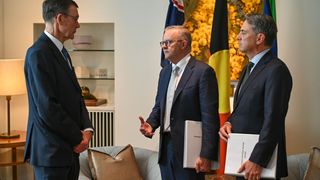The release of Australia's Defence Strategic Review (DSR) is one of the most significant moments in the nation's defence landscape in three decades. The review comes at a time of increasing global tensions over superpower rivalry, and conflict. As our CEO Dr Michael Green has noted, the DSR is the greatest shake-up of Australia's strategic defence thinking since the 1980s.
The DSR also lays out the strategic approach Australia should take in navigating these increasingly complex times, and some of the nation's key priorities in maintaining and enhancing its defensive capability.
Our experts shared their reactions to the DSR and what it means for the larger strategic landscape.
United States Studies Centre CEO, and former White House National Security Council Special Assistant to the President for National Security Affairs and Senior Director for Asia, Dr Michael Green
"This is the most significant defence strategic review since Paul Dibbs in the 1980s. But the environment is tougher today. The Soviets had the ambition to replace the United States and impose a new order on Asia but not the means. China has both, even if it is not as willing to take the risks the Soviets did because China is more interconnected with the world economically. The DSR makes it clear that business as usual will not keep Australia secure and sovereign. The shift from a “balanced” force for multiple scenarios to a “focused” force for the defence of Australia makes sense. This is about deterrence by denial – imposing a cost on any major power (but mainly China) that might try to coerce or attack Australia. And it is about sovereign capabilities that can be used unilaterally in the defence of Australia. All of this will be welcomed in Washington, Tokyo, Seoul and Delhi.
The alliance with the United States remains critical, of course. Sovereign capabilities will require advanced technology from the United States, which the Biden administration and Congress (and according to our polls the public) are happy to share since it helps American security indirectly as well. Because the focus is on deterrence by denial and not punishment, that means that ultimately the United States with its offensive forces and nuclear deterrent is the only guarantee that an attack on Australia could put at risk the attackers’ homeland (that is not a capability Australia is pursuing). So there is a mutually reinforcing dimension to sovereign capabilities and a strong alliance.
It is also important that the DSR emphasises unity of purpose, all-of-government approaches, and the primacy of statecraft – which Foreign Minister Penny Wong echoed in her speech to the National Press Club last week. This DSR is not a new definition of Australia’s national interest or a rejection of stable and productive relations with China. Nor is the military tool somehow more important than the economic and diplomatic tools in Australia’s kit. But the insurance provided by defence capabilities is clearly needed, and the Albanese government appears unified on that."
Senior Economic Advisor with the Economic Security Program at the USSC, Dr John Kunkel
"An overarching theme of the Albanese government’s Defence Strategic Review (DSR) is that national defence is too important to be left to our defence boffins and institutions. All parts of Australian society, indeed all citizens, have a big stake in lifting our game.
For a start, in a world of great power strategic competition and rising military threats, we’re the ones who have to pay for it. And with no sign the Australian people are about to give up “butter” (i.e. government services) for “guns”, we as taxpayers have a profound interest in making sure the right guns and other capabilities are delivered, when and where we need them, at a reasonable cost. More broadly, the DSR poses some searching questions for Australia’s private sector around the role it needs to play in a more contested and dangerous world. These come under the umbrella of “whole-of-nation strategies” with a call for more “unity of effort” to develop “national resilience”.
For example, how can we better tap our national innovation system – everything from university research institutes to venture capital firms – for national security purposes? Delivering our end of the AUKUS nuclear submarine roadmap is just the start. We need equal focus on AUKUS “Pillar II” – our national offering in areas such as artificial intelligence, quantum and cyber. The DSR specifically highlights the importance of new and emerging technologies in securing an asymmetric advantage over an opponent’s dissimilar capabilities.
This will require not just “joined up” policy institutions, clearer signals from the government and better acquisition processes. A larger set of private sector actors in Australia will need to start thinking of themselves as part of our defence tech-finance-industrial base. To be clear, not everything will involve the whizz-bangery of deep tech. The private sector can and should play a role in partnership with the government on tasks like financing, building and managing our upgraded northern operational bases, as well as delivering key transport and logistics support. Again, we can’t lose sight of value for money for taxpayers and the need for the ADF to focus on what the ADF does best.
Finally, the DSR usefully sketches a much wider scope of Australian economic statecraft in an era of strategic contest – covering issues like supply chain diversity, climate change resilience, and national fuel security. Like it or not, we need to prepare for a more volatile and fragmented global economy and here, too, the private sector needs to be part of finding creative solutions to national defence challenges."
USSC Research Fellow Tom Corben
"The Defence Strategic Review lays bare what USSC researchers have long argued: that in a more multipolar regional order characterised by rapid military modernisation and strategic competition, it is incumbent on Australia to step up its capacity to contribute to collective approaches to defence challenges in the Indo-Pacific. As the review states: “No longer is our Alliance partner, the United States, the unipolar leader of the Indo-Pacific,” with our immediate region increasingly characterised by “an emerging multipolar distribution of power” between constructive and disruptive regional actors alike.
In this context, Australia has both the agency and the responsibility to contribute to maintaining what Foreign Minister Penny Wong has referred to as “strategic equilibrium” in the Indo-Pacific – in short, upholding a favourable balance of power that pivots on multiple actors, not just one superpower. This is not a challenge that Australia must face alone: it’s an opportunity to work more closely with our regional friends and allies in new and unprecedented ways. If sufficiently implemented, the DSR could drive major enhancements to Australia’s capacity to contribute to collective defence efforts across the Indo-Pacific – and not just in the direct defence of Australia. Indeed, as the rReview notes correctly: “the threat of the use of military force or coercion against Australia does not require invasion.”
Being prepared to deter and respond to these threats in collaboration with like-minded partners has never been more essential. This is a view shared by key regional partners like India, Japan and the United States. New Delhi’s concept of multipolarity bears many of the same connotations as Canberra’s strategic equilibrium. Tokyo perceives a growing need to ‘restore strategic balance’ in the region through improving its own defence posture and wider military cooperation with countries like Australia. Meanwhile, the DSR echoes the Biden administration’s 2022 National Defense Strategy in stating that “a business-as-usual” approach to defence cooperation is insufficient to meet contemporary needs – something which initiatives like AUKUS and concepts like Washington’s Integrated Deterrence model, both of which underscore the essential role of allies like Australia in upholding a favourable balance of power, are intended to give expression to.
Evidently, Australia is in good company. Yet unpacking the subtle differences in these national views of emergent regional polarity, the objectives of unilateral military modernisation, and the desired end-states for collective defence strategies and for strategic competition more broadly, will be crucial to that Australia and its regional allies can genuinely claim to be singing from the same songbook when it comes to collective defence."
USSC Research Associate Sophie Mayo
"The Defence Strategic Review (DSR) marks a true reinvigoration of Australia’s defence strategy, concepts and relationships. Shaped by the new concept of national defence, which aims to support the maintenance of a balance of power in the Indo-Pacific, the review is bold in its assessment of the end of the US unipolar era. It offers the Australian public an honest and thorough explanation of the ways in which our national interests are compromised by intense China – United States competition.
On technology and asymmetric advantage, the DSR earmarks a shift from maintaining a broad-based regional capability edge to achieving asymmetric advantage, noting AUKUS advanced capabilities will be prioritised in this endeavour. This will hopefully give much-needed impetus to the Pillar II enterprise, however, is largely contingent on reforms to existing technology transfer and capability-building processes. These remain encumbered by the US International Trade in Arms Regulations (ITAR).
On capability acquisition, risk and accountability, the review recognises risk management mechanisms which have previously served us well are no longer fit for purpose. The prioritisation of timely capability delivery enabled by appropriate risk-based behaviours will ensure the Australian Defence Force is well-equipped to face the current and future strategic environment. Of course, this praise comes with the caveat that it is the implementation of the DSR’s recommendations, including the delegation of appropriate fiscal resources, upon which the final eventuation of DSR will rise or fall."
USSC Research Associate Alice Nason
"The new Defence Strategic Review proffers a solemn assessment of the Indo-Pacific security environment that acknowledges economic and diplomatic contests’ centrality to the balance of power in our region. That this watershed national security document repeatedly calls for “statecraft” led by a better-resourced Department of Foreign Affairs and Trade is highly significant. Foreign Minister Wong’s dedicated diplomatic efforts in the Pacific and Southeast Asia, then, can be viewed not as a temporary episode but as a new mainstay of Australia’s strategic policy. Accordingly, the review should catalyse urgent internal reform to the department, as well as budget increases and enhanced coordination of our Defence and Foreign Affairs bureaucracies’ efforts.
It is less surprising to see both pillars of AUKUS foregrounded in the government’s near-term objectives. Enhanced capabilities – nuclear-powered submarines foremost among them – are critical to both projection and denial. However, the challenges for AUKUS delivery are only growing. The Strategic Review has introduced an additional $19 billion dollars of immediate cost pressures to a budget that will already be pushed to its limits to deliver the costly AUKUS initiatives announced in March. While the reminder that Pillar II advanced technologies are prominent on the Department’s agenda is a reassuring one, how those efforts will be resourced remains an open question."










